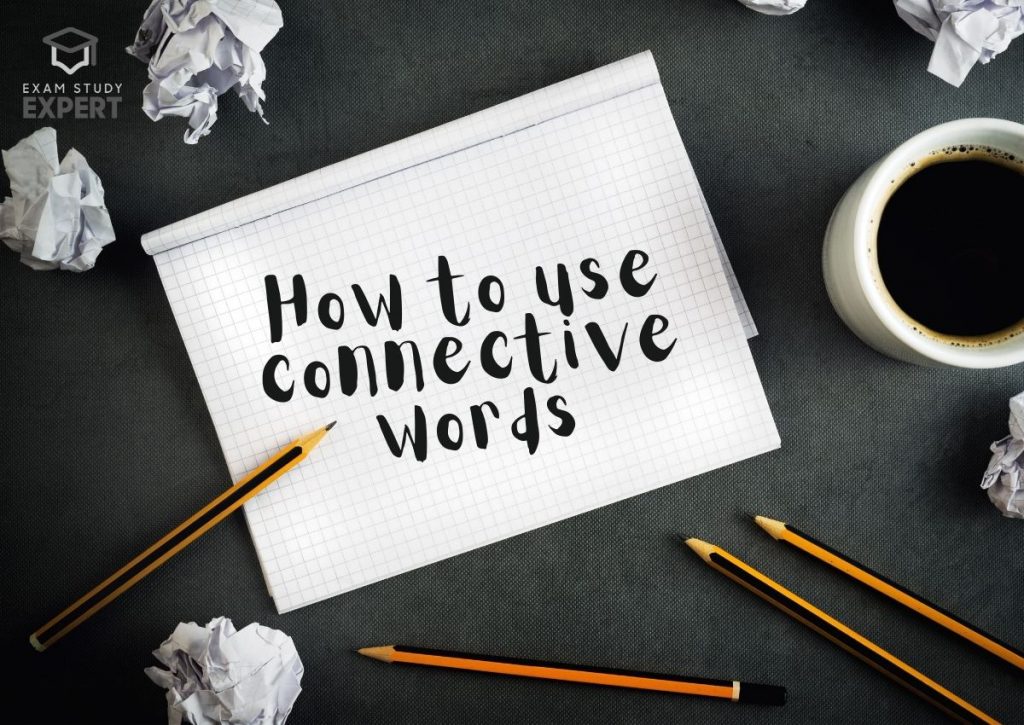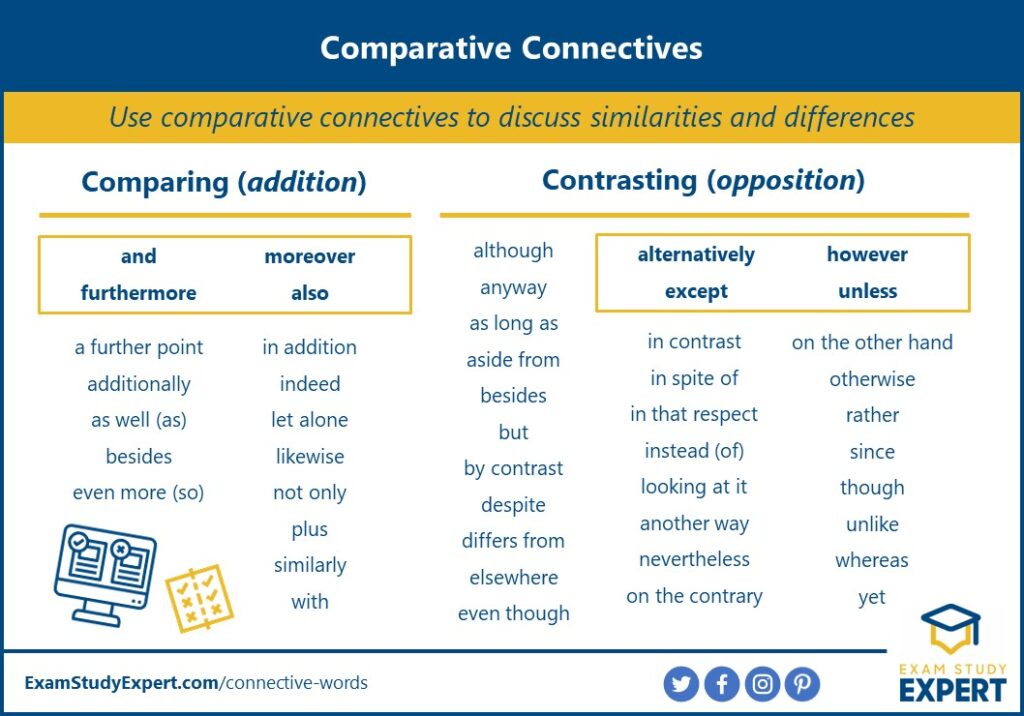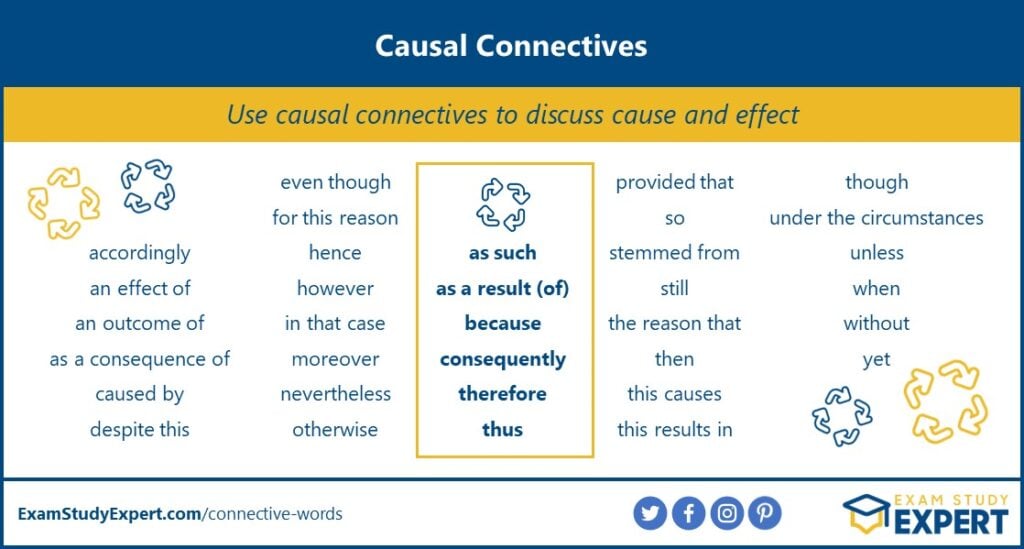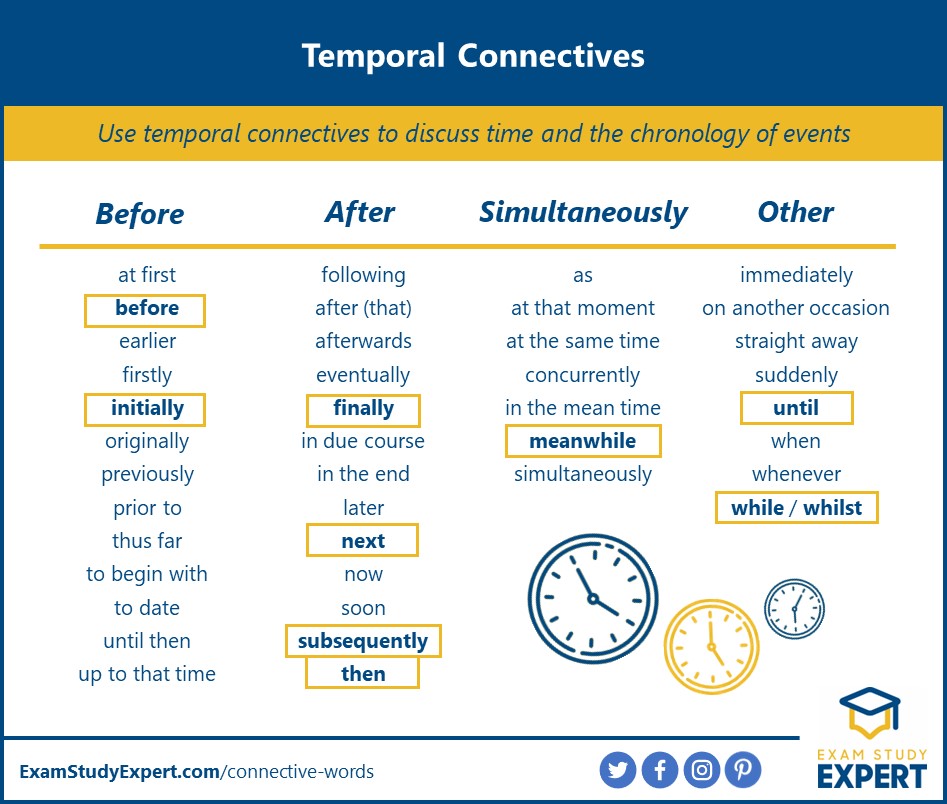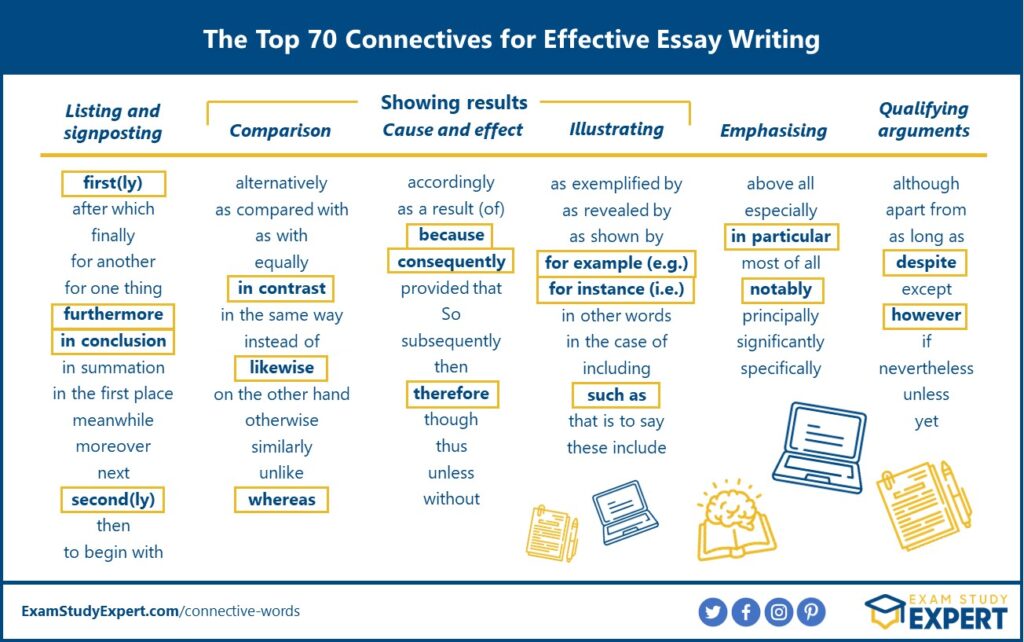Connectives connect and relate sentences and paragraphs. They assist in the logical flow of ideas as they signal the relationship between sentences and paragraphs. In prose, the material is supported and conditioned not only by the ordering of the material (its position) but by connectives which signal order, relationship and movement.
Some of the more commonly used connectives are listed below. Note especially how these connections function to develop, relate, connect and move ideas.
What for do we use linking or connective words?
Linking or connective words and phrases are used to show relationships between ideas. They can be used to join two or more sentences or clauses.
Linking words help to connect ideas and sentences when you speak or write English. We can use linking words to give examples, add information, summarise, sequence information, give a reason or result, or to contrast ideas.
Using linking or connective words and phrases
- can improve the quality of your speech
- your ideas flow more smoothly
- the logical relationships between the ideas are expressed clearer
- act like bridges between parts of your writing and speaking
- you decorate your written work or speech by making them sound or read better.
Here’s a list of the most common linking words and phrases:
To state personal opinion
In my opinion
In my opinion, Sunday is the best day of the week.
In my view
In my view, golf is just a game and not a sport.
Personally
Personally, I am against zoos.
I believe that
I believe that new sports facilities are necessary for our school.
It seems to me that
It seems to me that this magazine will be very popular among teenagers.
I think that
I think that the problem of polluted environment is one of the most urgent.
As for me
As for me, I am greatly interested in art.
As far as I am concerned
As far as I am concerned, art plays an essential part in my life.
There are a number of reasons why I believe
There are a number of reasons why I believe that television is one of the main sources of information.
To my mind
To my mind, there are many good sportsmen in our school.
To my way of thinking
To my way of thinking, tests are not a good way of measuring someone’s knowledge.
Personally I believe that …
Personally I believe that learning about survival skills sounds incredibly interesting.
It strikes me that
It strikes me that so few of them were willing to help.
I feel very strongly that
I feel very strongly that we have to do community work, such as helping the elderly.
I’m inclined to believe that
I’m inclined to believe that students have to wear a school uniform.
Based on what I know
Based on what I know, school helps to become a better person.
I am convinced
I am convinced you should avoid fizzy drinks.
Speaking for myself
Speaking for myself, I watch TV no more than two hours a day.
I am confident that
I am confident that children should use computers sensibly.
To list points
First(ly), first of all, to start with, to begin with
Firstly it is wrong and secondly it is extremely difficult to implement. First of all, let me ask you something. She wasn’t very keen on the idea to start with. To begin with, his is a genuine talent.
For a start
You’re bored and don’t knowwhat to do? Well, you could go play outside, for a start! I’m sick of living in this city —for a start, the traffic makes commuting to work an absolute nightmare!
In the first place
Why didn’t you tell me in the first place that you’ve decided to leave?
initially (at first)
Iitially, he thought the new concept was nonsense. Initially, Steve cleared tables and washed up
first and foremost
He is first and foremost a teacher. First and foremost, I want to thank all of you for being here tonight.
Second(ly)
I want two things from my boss – firstly, a pay rise, and secondly, a longer contract.
Third(ly)
There are three factors to take into account: firstly cost, secondly time, and thirdly staff.i
in the second place
I don’t want to go yet – in the first place I’m not ready, and in the second place it’s raining.
subsequently (after a particular thing has happened; afterward)
The officer decided to stop and subsequently made an arrest.
simultaneously (at the same time)
The telethon was broadcast simultaneously on 31 US networks.
and then
Data were systematically analysed separately and then compared with one another.
next
Next, entire cities banned smoking in all indoor public places.
formerly (previously, earlier, before)
Formerly, a hectare of this precious vineyard was worth 30,000 francs.
previously
Previously, there had been 25 houses sold at or above the independent appraised value.
finally
Finally, I’d like to thank everyone for coming this evening.
on the whole (all in all, altogether)
On the whole, it was quite a good speech.
ultimately (finally; in the end)
Ultimately, it’s a question of who is more popular.
lastly
Lastly, I’d like to ask you about your plans. Lastly, add the lemon juice.
last of all
Last of all, I again want to say a lot of thanks to you for this rare occasion and for the possibility of explaining the position of Ukraine in relation to very important issues discussed here today.
last but not the least
I would like to thank my publisher, my editor and, last but not the least, my husband.
To add more points on the same topic
what is more
He was now a king, and what was more, a well-beloved king.
You should remember it, and what’s more, you should get it right.
furthermore
Computers are cheaper nowadays; furthermore, they are lighter.
moreover
The report is badly written. Moreover, it’s inaccurate.
in adding (to this)
in addition
You haven’t paid the rent yet. In addition, you owe me money. Chris is on the basketball team this semester at Indiana School for the Deaf. In addition, he is on the soccer team.
in addition to this
John’s grades are terrible because he has been so lazy these days. In addition to this, his relationship to his parents got worse.
another reason
We will be here for one more week so we can finish up our work. Another reason we are staying longer is because we do not want to miss the conference.
besides
The trip is too expensive. Besides, I don’t really like hot weather.
also
John likes camping in the mountains. Also, John is an experienced hiker.
too (in addition; also)
not only … but
If the project fails this will have terrible consequences not only on our department, but also on the whole organization.
above all (most importantly)
Above all, don’t forget to call when you get there.
along with ( in addition to)
This is a plane carrying heavy radar equipment along with full fuel tanks. I went to the concert along with my friend.
additionally (also)
“Additionally, 45,000 people have already exhausted their unemployment benefits this year,” he said.
as well as
Rural women include farmers, as well as domestic servants.
equally important
This agenda item is equally important. Promoting inter-cultural dialogue was equally important.
To show sequence
Beginning: First, First of all, To start with
Continuing: Secondly, After that, Then, Next
Concluding: Finally, Lastly, Last but not least
To show cause and effect
because
We can’t go to Sue’s party because we’ll be busy working on our project.
because of
The plane was delayed because of the foggy weather. I was late to work because of the heavy traffic.
consequently (as a result)
He had spent most of his time hanging around instead of revising his lessons. Consequently, he had a lot of trouble answering the exam questions. The company is expanding. Consequently, there are jobs on offer. They have recruited more people and consequently the service is better. Flexible workers find themselves in great demand, and consequently earn high salaries
due to the fact that
This is partly due to the fact that many of them lack a basic education certificate. This is partly due to the fact that certain expectations cannot any longer be met.
as a consequence
This is constantly growing population of the Earth and as a consequence growing level of consumption. Many Arab countries were involved in actual military confrontation with Israel and, as a consequence, some of their territory was occupied.
as a result
Prices were reduced by 20%. As a result, sales increased. The weather is supposed to be drizzly and chilly today; as a result, the Festival will be cancelled.
therefore
A hurricane has been announced. Therefore, air traffic will be disrupted. I was too tired; therefore I decided not to go to the state fair last night.
for that reason
The school bus broke down last week and has not been repaired yet. So for that reason, our dance group is unable to go to Washington, D.C. to perform at Kennedy Center.
owing to (because of)
The concert has been cancelled owing to lack of interest.
since (for the reason that, because)
Delegates were delighted, since better protection of rhino reserves will help protect other rare species.
as (while, just as, at the time that)
Frank watched him as he ambled through the crowd.
for
She remained silent, for she was so depressed to talk.
thus
It is raining today thus we are not going to the beach.
that’s why
Ricky worked all day, from 8am until 11pm. That is why he stayed home instead of going camping with us.
To show similarity
likewise (in the same way; also)
The dream of young people is to grow old, and it is likewise the dream of their parents to relive youth. Just water the plants twice a week, and likewise the ones in the bedroom. Informal: “I don’t have time to spend hours preparing one dish!” “Likewise!” (= it’s the same for me)
similarly (in a similar way)
The children were similarly dressed. Cars must stop at red traffic lights: similarly, bicycles have to stop too.
in the same way
My mother did everything she could to educate us. In the same way, we put a high value on our children’s education.
To show contrast
yet
Sharon has not visited the Land of the Dragons, yet if she had had a kid, she would have gone by now.
however
The hotel was open. However, nobody came to the reception desk.
nevertheless (despite what has just been said or referred to)
Brain drain has terrible consequences on the developing countries. Nevertheless, nothing has been done to solve the problem or at least reduce its negative effects. He had severe injuries; nevertheless, he completely recovered.
nonetheless (in spite of that; nevertheless)
The weather was bitterly cold. He went hiking nonetheless. The play was great, nonetheless, I was sick of seeing it after the fourth time.
but
She’s very hard-working but not very imaginative. This is not caused by evil, but by simple ignorance. The play’s good, but not that good – I’ve seen better. I’m sorry, but I think you’re wrong when you say she did it deliberately.
Call me old-fashioned but I like handwritten letters. You can invite Keith to the party, but please don’t ask that friend of his party, but please don’t ask that friend of his. She’s not a painter but a writer. She’s not only a painter but also a writer. We mustn’t complain about the problem, but help put it right. I think it’s true, but then, I’m not an expert.
though
Though I eat green beans because they are healthy, I hate them.
although
Although she’s very nice, her classmates hate her. Although Steven was extremely tired, he washed the dishes.
even though (although)
Even though he left school at 16, he still managed to become prime minister.
even if
He is poor and has no house, but even if he had money, he wouldn’t buy a house.
in spite of the fact / despite the fact
In spite of the fact that he is rich, he lives in a small house.
in spite of / despite
In spite of/despite being blind, he walked to the station. Despite Fred’s old age, he goes jogging every morning. In spite of the cold weather, they enjoyed themselves.
whereas (in contrast or comparison with the fact that)
They have got two children, a boy and girl. The boy takes after his father whereas the girl takes after the mother. Tom is rich, whereas Jack is poor.
on the other hand
Laptops are convenient; on the other hand, they can be expensive.
on the contrary / conversely
Northern European countries had a great summer. On the contrary/conversely, southern Europe had poor weather.
To give examples
for instance / for example
There are several problems to consider; for instance/for example, there is a lack of public transport. Not all birds eat berries. For example, vultures eat dead animals.
such as
I have a few things to take care of such as paying bills, cleaning the house, and going to the post office.
like (such as; for example)
They study lots of subjects at school, like history, languages, maths, science, etc.
particularly (especially)
We’re particularly interested to hear from people who speak two or more European languages. I didn’t particularly want to go, but I had to.
in particular (especially)
What in particular did you like about the last apartment that we saw? Are you looking for anything in particular?
especially
He didn’t especially like dancing. I like sports games, especially basketball.
to illustrate
Jeff is an interesting person to know. To illustrate, he knows a lot about the history of Ireland.
Expressing purpose
in order to
She wakes up early in order to be on time to work.
in order not to
I left home early in order not to be late for the appointment.
so as
They visited him so as to offer their condolences for the death of his wife
so as not
He helped the new policewoman so as not to fail in her first mission.
so that
She arrived early so that she could help her colleagues.
To assert obvious truth
no doubt
There is no doubt that the dog buried the bone in the garden.
undoubtedly
Jeff told us an undoubtedly true story that was very scary.
without a doubt
The judge, without a doubt, thinks capital punishment is wrong.
of course
Of course, Sarah is going to the beach this weekend with her parents. She needs a break from Gallaudet.
naturally
Naturally Steven is not going to agree with that plan.
in fact
In fact, he thinks that the idea of setting up a business selling scarves would surely fail. Lisa decided not to go to King Islands. In fact she told me, “No, way.”
certainly
Certainly, you may borrow my book on the history of the community. But, be sure to return it to me next week.
conceding that
Conceding that Sally is a strong skater, Rachel still believes she will be able to beat her in the Olympics. Rachel wants to become the first deaf ice skater to receive a gold medal.
in other words
I feel that our last Student Council meeting did not go well. In other words, it was a fine mess.
needless to say (obviously)
Needless to say, because of the accident he won’t be at work for a while.
To introduce a conclusion
Finally
Finally, I’d like to thank everyone for coming this evening.
Lastly (used to show when something comes after all the other things in a list)
In accepting this award, I would like to thank the producer, the director, the scriptwriter, and, lastly, the film crew.
All in all
Sure, it rained on our vacation, but all in all we had a great time. All in all, the team has a bright future, even though
they didn’t make the playoffs this year. All in all, it was a very good party. All in all, I’m glad that I visited New York
City.
Taking everything into account
But taking everything into account, we can state that the general situation in the region is improving.
On the whole
On the whole, it is clear that tobacco production represents a small part of most economies.
In conclusion
In conclusion, she stressed the need for realistic and achievable targets.
To conclude
To conclude, I want to wish you all a very happy holiday season.
To crown it all
I had lost my ticket, was soaked to the skin and, to crown it all, discovered that my purse had been stolen.
To sum up
To sum up, our team is now one of the best in the world.
In brief
In brief, some improvements in the middle school program need to be made.
In a nutshell
Well, to put it in a nutshell, we’re lost.
When you’re writing an essay or assignment, you need to use every trick in the book to maximise your marks. And one of the best tools for radically improving your writing is the power of connective words.
Used correctly, connective words can give your writing new depth and meaning, improve readability (important for your examiner!) and demonstrate the logic of your arguments.
Luckily for you, we’ve got plenty of categories, definitions and connectives examples to help you get started…
Table Of Contents
- What are connective words?
- How to use connective words
- Types of connective words
- The TOP 70 connective words for effective essay writing!
- Good luck with your essay!
- The Science Of Studying Smart
Psst – this article uses loads of connectives. See if you can spot them in use: we’ve italicised the best examples!
What are connective words?
Simply put, connectives are words – or phrases – that link parts of your writing together.
You’re probably familiar with the most common connective words: and, as, because, but, if, or, so. In fact, I’ve used a few of them already – did you spot them?
Don’t limit your essay writing to the basics though, because there are hundreds of connectives that can help you to demonstrate different ideas, such as cause and effect, or the chronology of events.
We’re going to explore ten types of connectives below, but first, here’s a quick refresher on the grammar behind connective words:
Definitions: The grammatical bit
Understanding the grammar behind your writing might not be your thing – but bear with me, because remembering these six definitions will help you know which connective to use when, and where to place them!
(If you’re just looking for examples of connectives, feel free to skip straight past this bit!)
Connectives fall into three grammatical categories: conjunctions, prepositions, and adverbs.
- Conjunctions: are a type of connective BUT they’re not the same. Conjunctions join words, phrases, clauses and sentences together to form longer complex sentences.
- For example: and, but, for, or, yet.
- Today, I finished my history assignment but forgot to workout.
- Prepositions: describe the relative location, place and time between two things. They demonstrate time and space, direction and agency.
- Such as: at, in, of, on, under.
- I need to finish the conclusion of my essay before I go to dinner.
- Adverbs: modify verbs, adjectives and clauses. Adverbs explain how an action is carried out by adding detail, describing manner, and showing the how, when, where and why of the action.
- For instance: upwards, quickly, fortunately.
- My deadline is tomorrow. Fortunately, I proofread my thesis chapter already.
Using adverb and preposition connective words adds specific meaning – and thus clarity – to your writing. They are particularly useful for successful essay signposting.
Definitions part 2: Connectives in sentences
When using connectives, it’s also important to remember that not all sentences are created equal in importance. And so, when connecting them into longer sentences, different types of connectives create different results:
- Co-ordinating connectives: link phrases and clauses of equal importance to create compound sentences.
- For example: I find French tricky but I love learning Spanish.
On the other hand,
- Subordinating connectives: connect main clauses and subordinate clauses to create complex sentences.
- A subordinate clause relies on the main clause to make sense. Therefore, these connectives give information about the relationship between the clauses by specifying an order or place to events, or a cause and effect link.
- Here’s an example: I need to do my homework if I want to get a good grade.
A useful type of subordinating connective for essay writing is the:
- Sequencing connective: which will help you establish the logical sequence of events/ideas, or demonstrate a chronological order. Great for signposting!
- For instance: Firstly, I carried out the experiment, and secondly, I analysed the results.
And that’s your grammar refresh done!
If you’re struggling with essay-writing grammar, a great tool for checking your writing is Grammarly * – we use it at Exam Study Expert because it catches a broad range of mistakes. Their blog is also a great place to learn how to use conjunctions, prepositions, adverbs and more.
How to use connective words
So how do you go about using connectives?
In this section, we’re going to discuss the where, what and how …
Where to add connectives:
As we’ve seen, connective words are often found in the middle of a sentence, joining two clauses. But don’t forget you can also use them at the beginning of a sentence to link two consecutive sentences – OR two ideas within your paragraphs (did you see what I did there?).
Some of your connectives will even be linking entire paragraphs and sections – these are often examples of signposting to guide the reader through your section or argument.
What’s more, many connectives are not just single words but phrases. These connectives are particularly useful for essay writing and academic vocabulary. For example: as well as, for an example of this, for instance, in addition to, on the other hand, such as.
What to use connectives for:
When you’re writing an essay or assignment there are plenty of tasks you need to achieve: presenting evidence, making arguments and more.
Happily, connectives can help you achieve all these tasks by clarifying your meaning. You can use connectives for:
- Reinforcing or emphasising a point
- Exemplifying and showing results
- Comparing and discussing points of view
- Constructing a timeline or sequence of events
- Listing points (and signposting them)
- Explaining your argument
- Drawing together conclusions
It’s a long list! So master using connectives and you’ll drastically improve the readability of your writing across all sections of your essay.
How to add in useful connective words:
You’re probably already using basic connectives in your writing.
But if you want to get serious about the benefits to your grades, make sure you’re systematic about how you add them during your essay construction – and (later) proofreading to check they make sense on a large(r) scale!
From experience, I would suggest that the best method for choosing and adding effective connectives is to:
- Sketch out a rough draft of your paragraph or essay section
- Separate out the points you’re making and identify how these arguments relate to each other
- Are they separate arguments for the same thing? Or opposite points of view? Do they follow on logically (cause and effect) or chronologically?
- Mark where you want to add signposting connectives to indicate structure
- Check your examples of connective word types and choose options that convey the meaning you need…
And for that purpose, we’ve compiled four lists of connective words for you – including the TOP 70 connectives for effective essay writing! So read on…
Privacy protected because life’s too short for spam. Unsubcribe anytime.
Types of connective words
So let’s get down to the really useful stuff: examples of connectives you can use in different situations in your essays!
There are three main types of connectives that we’re going to explore in turn:
- Comparative, Causal, and Temporal
Comparative connective words
These helpful words and phrases are perfect both for comparing similarities in data and arguments, and for pointing out their differences and oppositions. Use them to compare, discuss and argue.
When comparing points, you’ll often be adding to your argument, so these connectives are used for “addition”. The most common connectives for addition are: and, also, furthermore, moreover.
Here are some examples in practice:
- Leonardo Da Vinci was an artist and inventor, and also an influential Renaissance humanist.
- Exam Study Expert’s psychologist William offers expert one-on-one exam coaching. Furthermore, you can sign up for a free introductory session!
- My empirical data demonstrates that … ; similarly, theoretical models projected …
On the other hand, you might need to demonstrate and contrast your argument with the opposing point of view with a connective for “opposition”. The most commonly used are: alternatively, except, however, unless.
These examples all demonstrate opposition:
- Winston Churchill is best known for his wartime leadership of the United Kingdom, yet he was already in his 60’s when he took office.
- Some students find great study motivation from starting the day with their hardest task. In contrast, others find getting the ball rolling with smaller tasks more effective.
- Our first questionnaire was comprised of six questions. However, for our second questionnaire we …
Causal connective words
Causal connectives are effective for discussing cause and effect – relationships that have logical links that you want to point out and prove.
As such, academic writing is often full of causal connectives, and many of them demonstrate a very academic vocabulary (great for bonus points in your assignment!).
Most essays and assignments have a section (or several sections!) where you need to draw together your facts, ideas and arguments and point out the connections. These are the connectives to turn to at those moments!
The most commonly used are: as such, as a result (of), because, consequently, therefore, thus.
Here are some examples:
- The brains of London taxi drivers have a larger than usual area that deals with memory because they are required to memorise and navigate thousands of streets.
- Flashcards are a highly effective learning and memory tool, provided that you use them correctly.
- This study surveyed over 3,000 students. As a result, we were able to …
Temporal connective words
Whether you’re explaining the sequence of events that led to a historical battle, or demonstrating the steps in your experiment, temporal connectives are a highly valuable tool.
They’re all about discussing time and the chronology of events – what happened before, during and after. Therefore, they make for great signposting words too!
These examples explore each of the four sections in our temporal connectives lists:
- The law of gravity was not widely understood until it was mathematically formulated by Sir Isaac Newton in 1687.
- If you’re stressed about your exams, mindful meditation can be a great help. At the same time,an inspirational quote might give you the boost you need!
- Initially, the experiment was expected to demonstrate … Eventually, we came to the conclusion that …
The TOP 70 connective words for effective essay writing!
To make sure that you’ve got the tools you need to improve your grades, we’ve compiled this epic list of all the best connectives to use in academic writing.
This is just a selection from the hundreds of connective words and phrases available. So there’s no need to make your essay stale by over-using the same one or two!
If there’s nothing else you grab when you’re ticking off Step #4 from the connectives methodology above – make sure you grab this list!
It covers all the stages of essay structuring and writing, from introduction to conclusion. And includes lists of connectives for:
- Signposting and listing
- Showing your results by:
- Comparing and contrasting
- Illustrating your findings
- Demonstrating cause and effect
- Emphasising points
- Qualifying your arguments
We’ve highlighted the best and most commonly used connectives for each section to ensure you’ve got THE best resource to improve the quality of your essay immediately.
To finish off, here are some examples to get your essay-writing inspiration flowing:
- Firstly, it is well-known that retrieval practice is an effective learning method as compared with re-reading study texts and notes.
- I’m feeling tired tonight. Nevertheless, I must finish my homework and I want to take the dog for a walk.
- When it comes to …, however, there are several effective methods to …, in particular, …
Good luck with your essay!
Now you’ve mastered adding effective connective words to your essay you’re ready for the next step. Be sure to check out our guide on proofreading your assignment before you hand it in. Good luck!
And for more expert, science-backed study resources, sign up to the Exam Study Expert newsletter right here:
** Please note: Grammarly is one of very few products we’re sufficiently enthusiastic about to recommend to our Exam Study Expert readers, and we may earn a small commission if you sign up to Grammarly services through the above link.
- About
- Latest Posts
Когда мы общаемся с людьми, то наша основная цель — передать информацию и быть правильно понятыми. Достичь этого будет гораздо проще с помощью специальных слов–связок – «linking words» или «linkers» – которые не просто украшают речь, но и помогают собеседнику понять сюжет вашего сообщения.
В русском языке мы также используем подобные слова: «например», «поэтому», «прежде всего», «в общем», «кроме того», «несмотря на это», «очевидно» и т.д. Давайте разберемся, какие английские эквиваленты таких слов и выражений входят в необходимый минимум для свободного общения
Пройдите тему в онлайн тренажере:
- Топ 100 слов уровня Pre-Intermediate
- Топ 100 слов уровня upper-intermediate
- Топ 100 слов уровня Intermediate
- Топ 100 фразовых глаголов
- Топ 100 слов уровня Elementary
Одной из основных целей каждого человека, изучающего иностранный язык, является сделать свою речь как можно более богатой, непринуждённой и приближённой к оригинальному варианту разговора.
Самый простой пример это слово and (и). Да, это союз, но в сложных предложениях он выступает связующим звеном между простыми предложениями.
Связующие слова нельзя отнести к определённой части речи, так как словом-связкой может быть и союз, и наречие, и предлог, и частица и так далее. Но основная функция этих помошников заключается в том, что они придают нашим высказываниям логически завершённую форму, такой себе четкий контур, к которому стремилась наша мысль.
| Категория | Слова и выражения | Пример |
| Причина и эффект | because (of) — потому что; так как; затем что; ибо; ввиду того, что; so — же; насколько; чтобы, таким способом, указанным образом, с тем чтобы; так; accordingly — соответственно; таким образом; следовательно; поэтому; в соответствии; thus — следственно, таким образом, в силу этого, так что, благодаря этому; consequently — следовательно; в результате; поэтому; вследствие этого; hence — следовательно; в результате; отсюда; therefore — по этой причине; вследствие этого; следовательно; потому; as – так как, ; оттого что; в связи с тем что; в силу того, что; due to (the fact that) – в связи с, согласно (тому что), по причине, исходя из, из-за, вследствие; owing to – по; из-за; вследствие; по причине; благодаря; since – по той причине что, учитывая, что. |
We had to wait because, it was raining. — Нам пришлось подождать, потому что шел дождь. |
| Акцентирование внимания | typically – как правило, типично, по большей части, как обычно, в большинстве случаев; as a general rule – как правило; обычно; в общем и целом; surprisingly – поразительно; на удивление; как ни странно; неожиданно; obviously – очевидно; безусловно; конечно; чересчур открыто; разумеется; in fact – собственно; фактически; более того; кстати; вообще; вообще-то; especially – в особенности; главным образом; в частности; особенно; clearly – бесспорно, прямо, разумеется, явно, четко, понятно; importantly – что немаловажно, важно; значительно; |
I don’t want to talk about this, especially with her. – Я не хочу говорить об этом, особенно с ней. |
| Сравнение | similarly — подобным образом; так же; аналогично; подобно; сходно; точно так ж; likewise — также; более того; тоже; так же, таким же образом; whereas — исходя из того, что; с учётом того, что; в связи с тем, что; on the other hand — зато; с другой стороны; но с другой стороны; впрочем; однако; except — за вычетом/исключением; кроме как; не говоря о; помимо; by comparison — для сравнения, в то время как; сравнительно; when compared to — по сравнению с; equally — в равной степени; одинаково; равно; наравне; in the same way — точно таким же образом; подобным образом; |
Life is difficult in extreme polls; similarly, it is horrible near the Equatorial regions. |
| Контраст | however — однако; yet — при этом, с другой стороны, впрочем, в то же время; still — при этом; even though — но хотя; несмотря на то,что; и хотя; даром что; on the other hand — хотя, с другой стороны, что же касается; otherwise — без этого, в противном/ином случае; after all — ведь, как-никак, не стоит забывать что, к тому же, напоследок; on the contrary — как раз наоборот, совсем наоборот, на самом деле, напротив; in contrast — в отличие от этого; для сравнения; напротив; unlike — в отличие; instead of — взамен; чем (вместо чего-л.); вместо; alternatively — или же; вперемежку; поочерёдно; иначе; наоборот; although, even – даже если; but – но, ведь; всего; исключая; хотя; |
Simon did not pass the exam then; nevertheless, he got high skills in English now. — Саймон не справился с экзаменом тогда, как бы то ни было, у него все отлично с английским сейчас. |
| Дополнение | and — и, причем, а не, при этом, а также, тогда как; also — тоже; притом; при этом, а еще, также, в том числе, кроме того; even — вровень; даже; точно; хоть; на одном уровне; ровно; again — снова, опять же, вновь; ещё раз; к тому же; кроме того; вдвое; further — к тому же, также, еще; к тому же; similarly — подобным образом; так же; аналогично; подобно; сходно; точно так же; as well as — а также; а также и; так же как; также; заодно и; apart from – кроме. исключая; наряду; не говоря о; независимо; оставляя в стороне; besides – кроме того; помимо того; также; вдобавок к тому; кроме; помимо; кстати; in addition – к тому же; moreover – кроме того; более того; сверх того; к тому; мало того; too – очень; крайне; также; тоже; к тому же. |
It is very hot today; moreover, there is a power outage. — Сегодня очень жарко, кроме того, произошел перебой питания. |
| Пример, подтверждение | for instance — например; in this case — в этом случае; in another case — в другом случае; in this situation — в данной ситуации; in this manner — таким образом, таким способом, эдак (этак); to illustrate — для иллюстрации / наглядного примера; to my mind — на мой взгляд, по моему мнению; in my opinion – по моему мнению, на мой взгляд; from my point of view – с моей точки зрения; for example – например; as follows – следующий; such as – такой как; |
I think he is very rich; for example, he gave a hundred bucks to a hobo. — Я думаю, он очень богат, например, он дал 100 баксов бомжу. |
| Последовательность | first — в первую очередь, во-первых, первоначально; second — во вторую очередь, во-вторых, в следующих, далее; third — в-третьих, в третью очередь, третье; next — далее, следующим шагом, потом; затем; после; then — затем, позже; после чего, то время; в дальнейшем; following — исходя из этого, в результате, вследствие; now — теперь, нынче, вот, итак, в настоящее время; at this point — на данный момент, на этой стадии; на этом месте, пока что; after — после; eventually — в конечном счёте; в итоге; со временем; однажды; finally — наконец, в конце; в заключение; под конец; в конце концов; в конечном счёте; lastly — на последнем месте, в конце; в заключение; под конец, наконец; previously — предварительно; заранее; ранее; прежде; раньше; уже; |
First, I’d like to get to know you. — Сперва, я бы хотел познакомиться с тобой. |
| Подведение итогов | on the whole — в целом; учитывая все обстоятельства; в итоге; вообще; в среднем; in sum, to sum up, in summary – подводя итог; thus — таким образом, отсюда и; as a consequence – как результат, в результате, соответственно, и, как следствие; as a result – в результате; hence – таким образом, исходя из этого, получается, следственно; in brief, in short – коротко, вкратце; in conclusion – в заключение, в завершении, напоследок, подводя итоги; so – итак, therefore – таким образом, по этой причине; вследствие этого; следовательно; потому; to conclude – делая выводы; |
In brief, it is a good film. — Короче, это хороший фильм. |
Читай также
Как стать звездой American Idol
Время и последовательность
Если мы рассказываем о каком-то процессе, например, приготовлении салата или строительстве дома, и хотим логически выделить его этапы, то нам пригодятся такие слова-связки:
- firstly, to begin with, for a start, first of all — начало процесса;
- after that, next, secondly, subsequently — продолжение;
- to conclude, finally, last of all — завершение.
Советуем к прочтению: Чем отличается Start от Begin?
First of all, choose the place where you would like to spend your holidays. After that, you should book tickets and a hotel room. Finally, you can start packing suitcases.
Дополнение
Когда мы дополняем сказанное новыми фактами, можно использовать следующие фразы:
in addition to, apart from, besides, moreover, as well as, also.
Apart from the budget, we discussed new marketing strategies.
Высказывание своей точки зрения
Иногда нужно подчеркнуть, что какая-то идея — это именно ваше мнение. С одной стороны, вы можете выделить оригинальность вашей мысли, с другой стороны, такое высказывание звучит менее категорично и более вежливо. Вот некоторые связующие слова для выражения ваших собственных суждений:
- to my mind, it seems to me;
- inclined to think, strongly believe.
I am inclined to think that our government should take more effective steps to protect the environment.
Ссылка на других
Это очень даже по-английски — преподносить какой–либо факт, ссылаясь на общественное мнение. Как и в случае с собственной точкой зрения, это помогает избежать категоричности и делает любое заявление более лояльным:
- it is said that, it is usually believed, it is claimed that;
- people often think, some people argue that.
It is usually believed that black cats bring bad luck.
Пример и подтверждение
Чтобы убедиться, что вас поняли правильно, можно повторить основные моменты другими словами или с использованием конкретных примеров:
- in other words, for example, to illustrate;
- namely, one example of this.
Nowadays, healthy lifestyle is becoming really popular. For exampe, the fact that more and more people stop smoking.
Сравнения и контраст
Иногда нам нужно показать контраст между несколькими явлениями или фактами, иногда мы хотим найти сходство между ними. В обоих случаях можно использовать соответствующие слова–связки:
- in contrast, in spite of, however, in comparison with, unlike — эти слова показывают различия;
- similarly, just like, likewise, in the same way, equally — способы передачи сходства.
I have always liked reading books, unlike my brother, who really hates it. However, we enjoy watching movies together.
Причина и эффект
Если мы хотим донести до собеседника логическую структуру каких-то событий, показать, что именно привело к таким последствиям, то нам помогут такие фразы:
- because of, due to, since, as;
- therefore, consequently, as a result, so.
Yesterday he was stuck in a traffic jam. Because of that he was late for the meeting.
Акцентирование внимания
Чтобы подчеркнуть значимость своих слов, обратить на них внимание собеседника, возьмите себе на вооружение некоторые из этих слов:
- indeed, in fact, particularly, no doubt, obviously,
- needless to say, as a matter of fact, surely, certainly.
Needless to say, I was really glad to receive such a nice present.
Предложение альтернативы
Если у нас есть возможность рассмотреть другие варианты развития событий, почему бы не показать это? Всегда приятно иметь выбор, поэтому берите любое словосочетание из этой подборки:
- on the other hand, alternatively;
- the alternative is, another possibility would be.
Not everyone can find enough free time for attending English courses. The alternative is to study English via Skype.
Подведение итогов
Когда вы делаете выводы, нелишним будет повторить основные пункты с помощью определенных связующих слов:
- as has been noted, finally, in brief, in short,
- to summarise, in conclusion.
In conclusion, I’d like to say that this contract is extremely important for our company.
Читай также
Где читать стихи на английском: подборка сайтов
Заключение
Мы надеемся, что отныне ваша речь станет более красивой, благодаря данной статье. To summarize, хотелось бы добавить 3 общих совета по использованию слов-связок. Помните, что:
- все хорошо в меру, поэтому не стоит переусердствовать с количеством;
- лучше освоить 10 простых linking words, чем быть непонятым из-за употребления сложных;
- даже если какое-то выражение вам очень нравится, не стоит начинать с него каждое предложение.
Студенты, которые занимаются на наших занятиях по Скайпу, так любят фразу «I think», котора легко заменяется на «I believe» или «I suppose». Keep that in mind and be creative!
Спасибо за внимание и до скорой встречи!
Большая и дружная семья EnglishDom
Connecting words and phrases in the English language is one area you will need to master, as you are learning the language. The English language is difficult, but hopefully, this short article will help you understand how to use linking words and phrases correctly.
When Would You Need to Connect Words and Phrases in English?
Words and phrases need to be connected for a variety of reasons. For example, you may want to make a comparison, contrast, show purpose or demonstrate condition. Most of the connectives, words that form the connection, are used to join two clauses together or start a new sentence expanding on the previous statement.
Linking Clauses Within A Sentence
The words included here are used when you want to join two parts of the sentence together.
Although/even though
- Although she is old, she can still run far.
Even if
- She is pretty and single, but even if she wasn’t pretty, she would still be single.
In case
- You might want to take flat shoes; in case you want to dance later.
In spite of/despite
- In spite of/despite the fact she was busy, she still made time to volunteer.
So that
- He took a large umbrella so that if it rained, he wouldn’t get wet.
Whatever
- You can rely on me whatever happens.
Whereas
- Samantha has a dog, whereas Billy does not.
Whenever
- I would lend money to you whenever you need it.
Wherever
- I will still care for you wherever you go.
Above are different word choices you may use when you are linking two parts (or clauses) of a sentence. This list is by no means extensive and you may find other connectives that fit your subject better. These are just a few examples to show you some different connectives and how they can be used within a sentence.
Linking Two Separate Sentences
The linking words and phrases included here are used when you want to link two complete sentences together. Remember, if a connective word starts the sentence it should be followed by a comma. The words in this section will be grouped, as they can often be used in place of one another.
As a result/Consequently/Furthermore
- The company is growing. Consequently, there will be more jobs on offer.
Besides/Furthermore/In addition/More over
- The holiday is too expensive. Besides, I don’t really want to go.
However/Nevertheless/Nonetheless
- The shop was open. However, nobody came to the kiosk.
In the same way/ Likewise/ Similarly
- I believe that teenagers are respectful. Similarly, research has shown this.
The above words can be used if you are linking two separate sentences together. As stated before, the list is not exhaustive. However, this should give you a good idea of the connectives out there and the way to use them to join two sentences.
In Summary
The English language is tricky to learn and connecting words (or connectives) are part of that. Hopefully, there are enough examples of linking words and phrases included here to get you started. You may even be able to add more to the list yourself.












